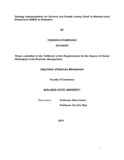Please use this identifier to cite or link to this item:
https://cris.library.msu.ac.zw//handle/11408/767| Title: | Strategy implementation for survival and growth among small to medium-sized enterprises (SMES) in Zimbabwe | Authors: | Nyamwanza, Tonderai | Keywords: | Economic development Small to medium enterprises |
Issue Date: | 2014 | Publisher: | Midlands State University | Abstract: | The Zimbabwean economy has been in free fall with an economic decline of up to 50% over the past seven years. However, since February 2009, the economy has stabilised and signs of growth are now evident. Nonetheless, there has been massive scaling down in terms of capacity utilisation and employment creation on the part of large businesses, a situation made worse by the drying up of direct foreign investment. This situation calls for locally-driven solutions to boost both economic activities and employment creation. Small to Medium-sized Enterprises (SMEs) have a key role to play in driving local economic development. However, to date, social and economic support structures have had little impact on the growth and survival of SMEs. The social, economic and political changes that are impacting on the business environment require owners to be proactive. While a supportive environment and favourable policies have not resulted in SMEs playing a bigger role in Zimbabwe’s economy, there is evidence of their growing contribution. Strategic planning and implementation are pivotal tools in increasing SMEs’ contribution to economic development and employment creation. Most SMEs players have a business vision and goals. While strategic planning and performance measurement are in place, in some instances SMEs adopt identical strategies but produce very different results. This calls into question the manner in which these strategies are implemented. Business owners/managers have to change the way they do business. This study examines how SMEs in Zimbabwe implement strategies to achieve both survival and growth. It also seeks to establish the reason why SMEs implement strategies the way they do. This is phenomenological study which used a multiple case study approach to unravel how Zimbabwean SMEs implement strategies. A convenience sampling technique was used to select those institutions that had a strategic plan and were realising some growth. In depth interviews were conducted to draw information from a sample of respondents iii from all sectors. The study ascertained that most SMEs adopted different approaches to strategic planning and implementation. Two forms of strategic focus were identified i.e. the traditional family businesses whose strategy formulation approach is decided on by family members. The focus here was more local geographic expansion and unrelated diversification which resonated well with the desire for the security of the family members. On the other hand the innovative organisations had a formal business focus strategy formulation approach which emphasized growth in the business through vertical integration and expansion beyond Zimbabwe. How strategy was formulated influenced the implementation approaches adopted by the SMEs. The study found that most SMEs expanded at the local level, which resonated with the desire for personal economic security. To a large extent, the implementation of their business strategy was determined by the desire for such, with business operations being anchored by the acquisition of property as insurance against potential failure. Such assets will be sold to raise capital internally when expanding or mitigating failure instead of sourcing loans or outside investments. The study suggests found out that most SMEs focused more on business survival than growth. In order to support national economic growth, there is a need to marry the survival model and the growth model. For survival and growth SMEs need to formalise and adopt systematic approaches to strategy formulation and implementation if these institutions are to contribute meaningfully to economic development and employment creation. It is hoped that future studies will help develop and refine implementation models so that SMEs in Zimbabwe in order for them to improve strategy implementation for sustained growth. | URI: | http://hdl.handle.net/11408/767 |
| Appears in Collections: | Thesis |
Files in This Item:
| File | Description | Size | Format | |
|---|---|---|---|---|
| nyamwanza_final.pdf | 2.2 MB | Adobe PDF |  View/Open |
Page view(s)
448
checked on Jan 15, 2025
Download(s)
1,090
checked on Jan 15, 2025
Google ScholarTM
Check
Items in MSUIR are protected by copyright, with all rights reserved, unless otherwise indicated.


